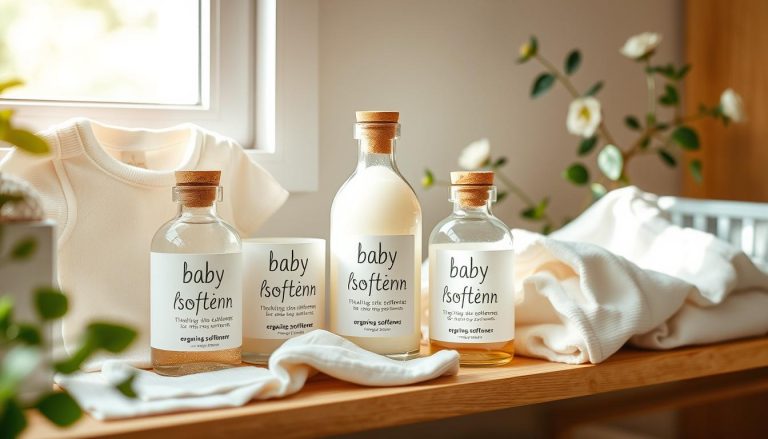As a parent, you want the best for your baby. This includes using eco-friendly fabric softeners that are gentle. The global market for fabric softeners was $15.7 billion in 2020. It’s expected to grow to $19.7 billion by 2026.
You can find many eco-friendly options. Brands like Public Goods, Grove Collaborative, and Viren Apothecary offer natural choices.
There are many eco-friendly fabric softeners to choose from. Dropps and Elisa & Millie offer affordable natural options. You can also make your own using water, baking soda, vinegar, and essential oils.
Choosing any of these options means you’re giving your baby the best. You’re also being kind to the planet with eco-friendly fabric softeners.
Table of Contents
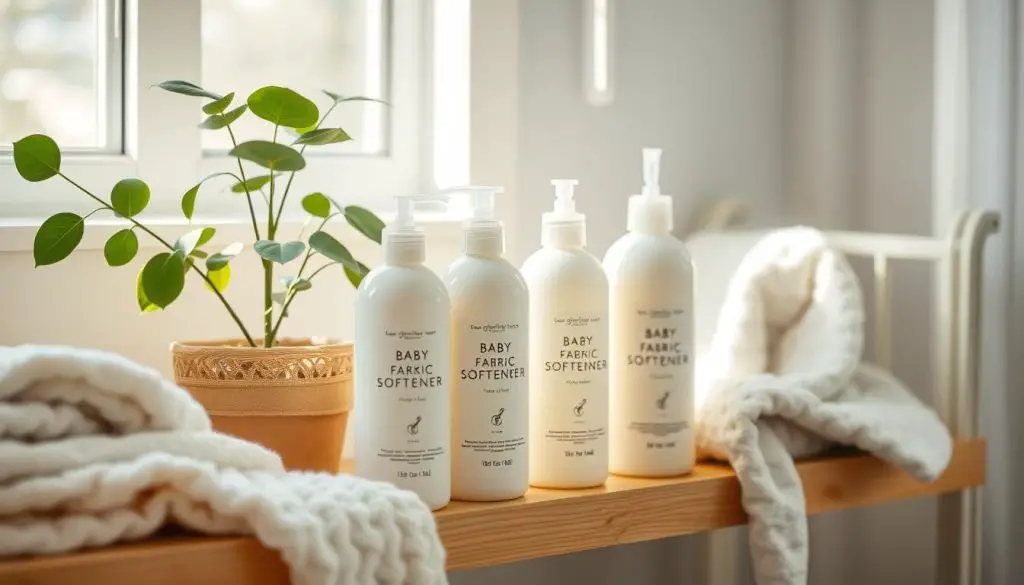
The Importance of Eco-Friendly Baby Fabric Softeners
As a parent, you want the best for your baby. That means using organic fabric softeners for infants that are safe for their skin and the planet. Traditional fabric softeners can harm, as they use chemicals that might irritate skin or cause allergies. On the other hand, eco-conscious baby laundry products are kinder and better for our planet.
Choosing eco-friendly options can lower the chance of skin problems and allergies. It also helps protect our environment from the harm of regular fabric softeners. Eco-conscious baby laundry products are made from natural stuff that breaks down easily, reducing waste and pollution.
Here are some key benefits of using organic fabric softeners for infants:
- Gentler on baby’s skin
- Reduced risk of skin irritation and allergies
- More sustainable and eco-friendly
- Biodegradable ingredients

By picking eco-conscious baby laundry products, you help make a healthier, greener world for your baby to grow in.
| Traditional Fabric Softeners | Eco-Friendly Fabric Softeners |
|---|---|
| Chemical lubricant film | Natural and biodegradable ingredients |
| Can cause skin irritation and allergies | Gentler on baby’s skin |
| Contribute to environmental pollution | More sustainable and eco-friendly |
What Makes a Baby Fabric Softener Truly Eco-Friendly
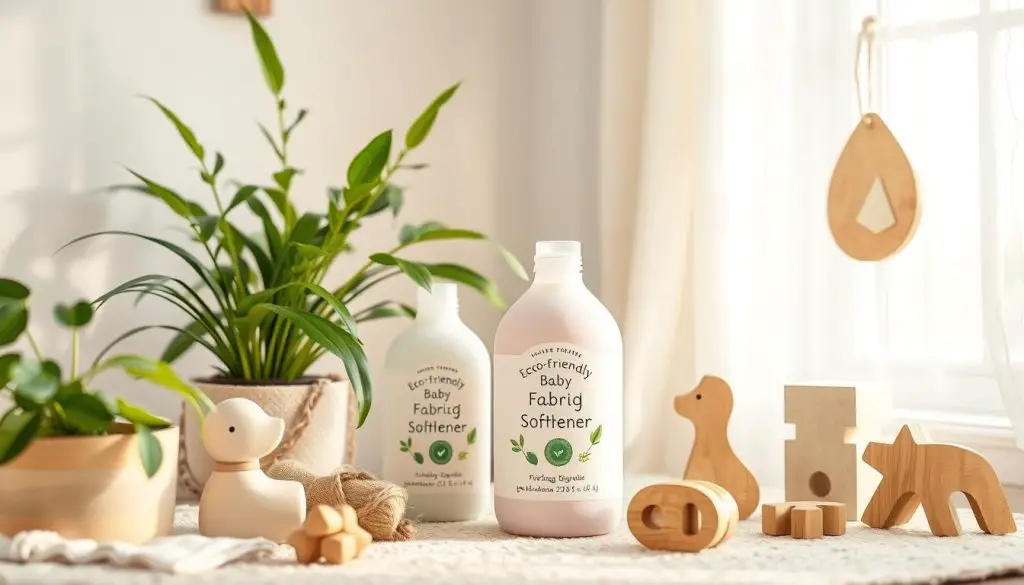
Choosing a baby fabric softener is important. It should be gentle on your baby’s skin and the environment. Non-toxic fabric softeners
Eco-friendly baby fabric softeners use plant-based ingredients and are biodegradable. They don’t have harmful chemicals like sulfates, phosphates, or artificial fragrances. Gentle fabric softeners for babies must also be hypoallergenic for sensitive skin.
Here are some features to look for in an eco-friendly baby fabric softener:
- Plant-based ingredients
- Biodegradable
- Free from harsh chemicals
- Hypoallergenic and suitable for sensitive skin
By picking a baby fabric softener with these features, you ensure your baby’s clothes are soft, safe, and eco-friendly.
| Brand | Features |
|---|---|
| Dropps | Eco-friendly, plant-based ingredients, biodegradable |
| Ecover | Plant-based ingredients, fully recyclable packaging |
| Soganics | 100% vegan, certified natural ingredients, hypoallergenic |
Key Ingredients to Look for in Natural Baby Fabric Softeners
Choosing eco-friendly laundry options for babies is key. Look for chemical-free baby fabric softeners that are gentle. Plant-based enzymes, essential oils, and natural minerals like bentonite and quartz are safe.
These ingredients soften fabrics well without harming baby’s health or the environment. Check for USDA Organic or EWG Verified certifications to meet your standards.
Here are some ingredients to look for in natural baby fabric softeners:
- Plant-based enzymes
- Essential oils
- Natural minerals like bentonite and quartz
And here are some ingredients to avoid:
- Artificial fragrances
- Phthalates
- Formaldehyde
Choosing natural baby fabric softeners with these safe ingredients ensures soft clothes. They are gentle on baby’s skin and support a sustainable lifestyle.
| Ingredient | Benefits |
|---|---|
| Plant-based enzymes | Gentle on skin, effective at softening fabrics |
| Essential oils | Natural fragrance, can help soothe skin irritations |
| Natural minerals | Help to soften water, reduce static cling |
Top-Rated Plant-Based Fabric Softener for Sensitive Baby Skin
Choosing an eco-friendly baby fabric softener is important. You want something gentle for your baby’s skin and the planet. Grove Collaborative offers a softener with plant-based ingredients in Free & Clear (unscented) or Lavender & Rosemary scents. It’s perfect for sensitive baby skin.
This natural fabric softener is hypoallergenic and free from harsh chemicals. Your baby’s clothes will be soft and fresh without any irritation.
This eco-friendly baby fabric softener softens fabrics gently. It’s made with natural ingredients and free from harsh chemicals. This means it’s safe for your baby’s skin and good for the environment.
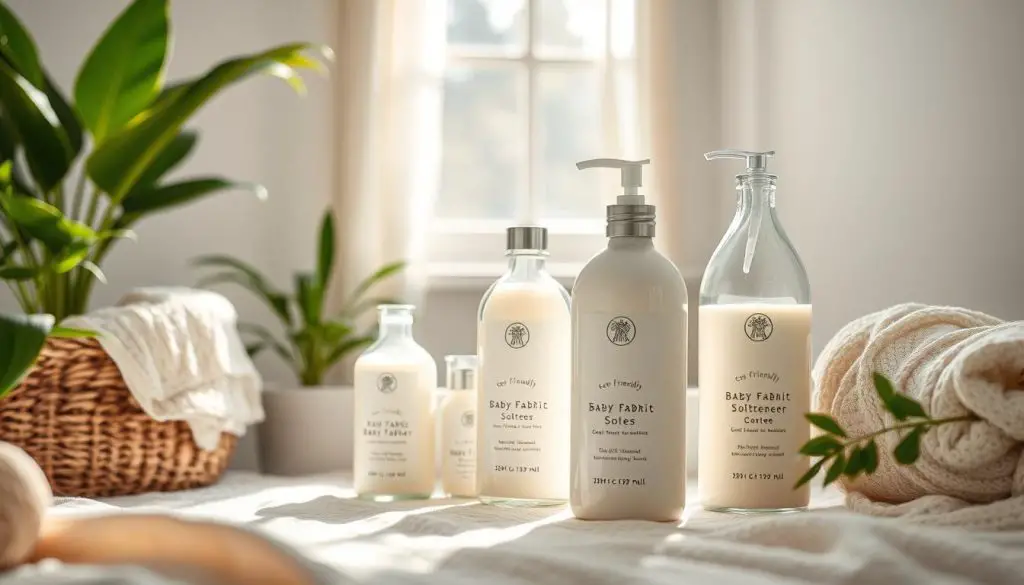
This fabric softener also reduces static cling and leaves clothes smelling fresh. As a parent, you want the best for your baby. Using this eco-friendly fabric softener shows you care about your baby’s health and the planet.
By choosing this natural fabric softener, you help reduce your environmental impact. You create a healthier home for your baby to grow and thrive.
This top-rated plant-based fabric softener is a great choice for parents. It’s eco-friendly, gentle, and effective. You can trust it to meet your high standards for your baby’s care.
Best Hypoallergenic Options for Newborns
Choosing the right fabric softeners for your newborn is key. You want options that are hypoallergenic to avoid irritation and allergic reactions. Gentle fabric softeners for babies are made without harsh chemicals, dyes, or fragrances. Opt for organic fabric softeners for infants that use natural ingredients and are certified.
Fragrance-Free Choices
Fragrance-free fabric softeners are perfect for newborns. They lower the chance of skin irritation and allergic reactions. Brands like Babyganics and Seventh Generation offer gentle fabric softeners for babies. These are free from harsh chemicals and artificial fragrances.
Dermatologist-Tested Products
Dermatologist-tested products are also a good choice for newborns. They’ve been thoroughly tested to be safe for sensitive skin. Look for products that have been tested by dermatologists and are certified as hypoallergenic. Organic fabric softeners for infants that are dermatologist-tested give parents peace of mind.
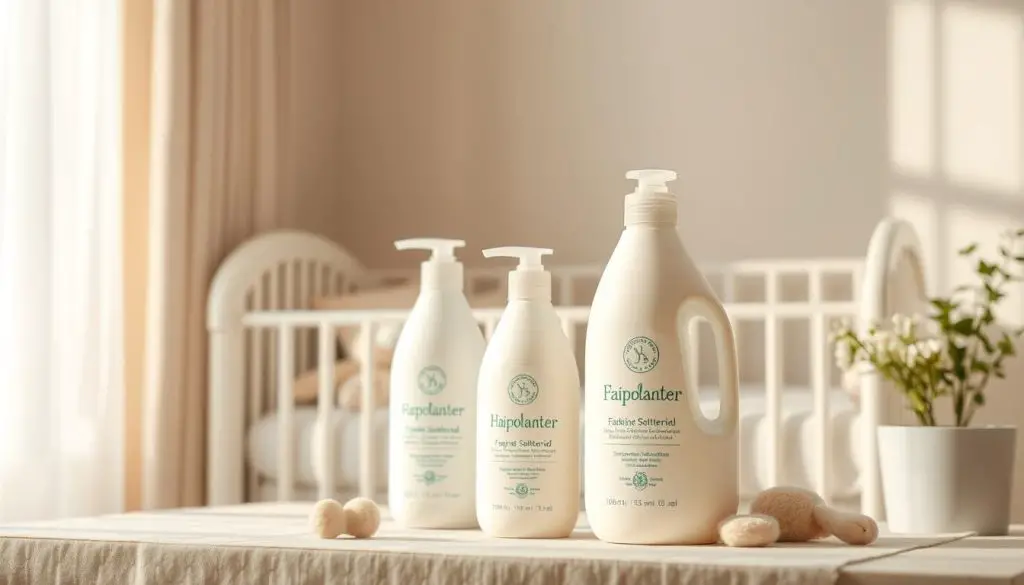
Budget-Friendly Eco-Conscious Fabric Softeners
As a parent, you want the best for your baby. This includes using eco-friendly laundry products that are gentle. You might think these products are pricey, but many affordable options exist. They don’t sacrifice quality or environmental care.
Mrs. Meyer’s Clean Day Fabric Softener and Method Fresh Air are popular choices. They use natural ingredients and are biodegradable. Plus, they fit various budgets. You can also make your own fabric softener with items like baking soda and vinegar.
Here are some benefits of using eco-conscious fabric softeners:
- Gentle on baby’s skin
- Biodegradable and non-toxic
- Affordable and budget-friendly
- Made with natural ingredients
When looking for eco-friendly fabric softeners, check for “USDA Organic” or “Green Seal” labels. These ensure the product meets high standards. Also, check the ingredients to avoid harmful chemicals like phosphates and parabens.
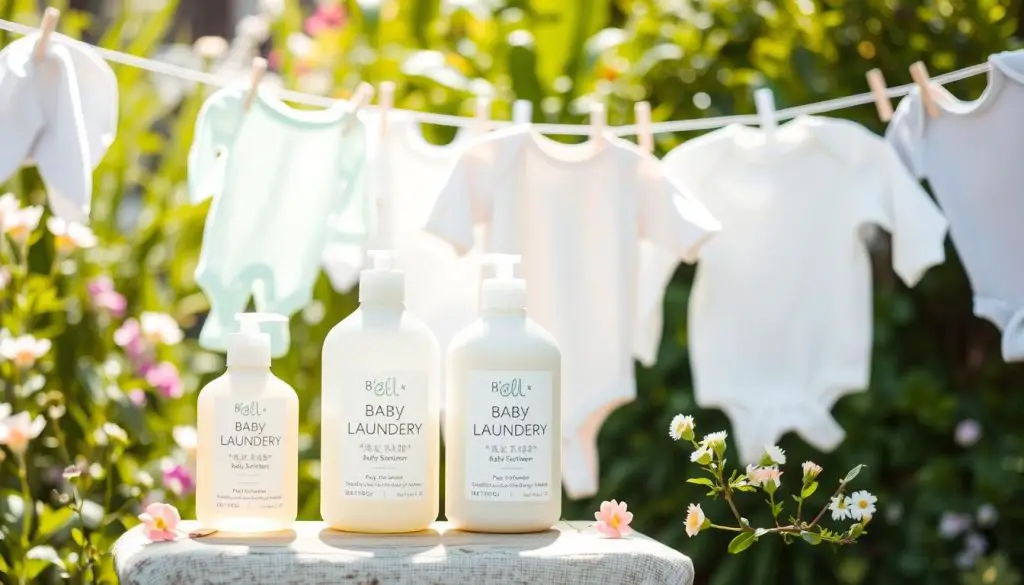
Choosing budget-friendly eco-conscious fabric softeners helps keep your baby’s clothes soft. It also supports the environment. Always read labels and look for certifications to ensure quality.
DIY Natural Fabric Softening Solutions
As a parent, you want the best for your baby. This includes using eco-friendly laundry options that are gentle on their skin and the environment. Making your own DIY natural fabric softening solutions is a great way to do this. These solutions are not only chemical-free but also save money and are easy to make.
A simple DIY recipe includes mixing two parts warm water, one-part baking soda, and one-part vinegar. You can also add optional essential oils for fragrance. This solution is a better choice than commercial fabric softeners, which can harm health and the environment.
Vinegar-Based Solutions
Vinegar is a natural fabric softener that removes dirt and odors from clothes. It’s a good choice instead of chemical-based fabric softeners. You can mix vinegar with water and baking soda to make a solution that’s gentle on clothes and the environment.
Essential Oil Blends
Essential oils can be added to your DIY fabric softening solutions for a fresh scent. Popular essential oils for laundry include lavender, tea tree, and eucalyptus. These oils not only smell nice but also have antibacterial properties that keep your baby’s clothes clean and fresh.
Natural Wool Dryer Balls
Natural wool dryer balls are another great choice instead of commercial fabric softeners. These balls soften clothes and reduce drying time. They’re also reusable, making them a cost-effective and eco-friendly option.
Using these DIY natural fabric softening solutions keeps your baby’s clothes soft and clean. It also reduces your environmental impact. These solutions are easy to make, cost-effective, and gentle on clothes, making them a great alternative to commercial fabric softeners.
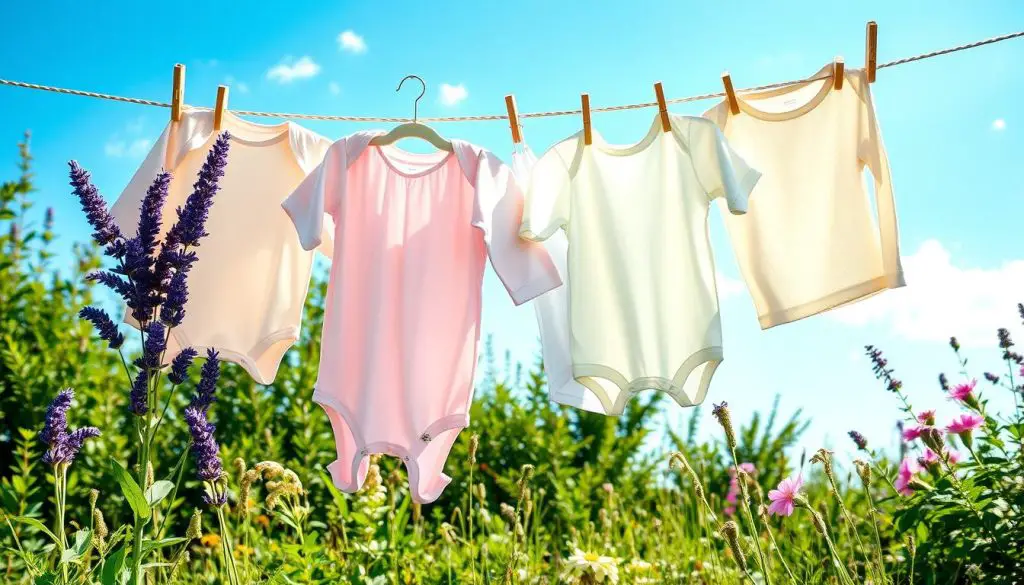
| DIY Fabric Softener Recipe | Cost | Softness Rating |
|---|---|---|
| Vinegar-Based Solution | $2.17 | 7 out of 10 |
| Conditioner-Based Solution | $1.04 | 8 out of 10 |
How to Maximize the Effectiveness of Natural Softeners
To get the most out of your eco-friendly baby fabric softeners, use them correctly. Following the right usage guidelines can greatly improve their effectiveness. For example, diluting Grove Co’s fabric softener with water can prevent clogs and ensure the best results.
Proper Usage Guidelines
When using eco-friendly baby fabric softeners, it’s important to follow the recommended amounts. This depends on the load size and water temperature. It helps avoid over- or under-dosing, which can impact softening performance. Always check your baby’s clothes for the right amount of natural softener.
Storage Tips
Proper storage of your natural baby fabric softeners is key to maintaining their quality. Store them in a cool, dry place, away from sunlight and moisture. This prevents bacteria and mold growth, keeping the softeners effective. By following these tips, you can keep your baby’s clothes soft and fresh.
Popular natural fabric softener alternatives include vinegar, baking soda, and organic essential oils. You can mix these with your eco-friendly baby fabric softeners for better performance and a fresh scent.
Choosing natural baby fabric softeners and following usage guidelines helps reduce environmental impact. It also keeps your baby’s clothes soft and gentle. Always check the ingredients and certifications of your eco-friendly baby fabric softeners to meet your standards.
| Product | Price | Description |
|---|---|---|
| Premium Starter Kit | $75 | A complete kit for natural laundry |
| The Concentrate | $55 | A simple laundry system for washing, deodorizing, and de-staining |
| Oxygen Boost | $22 | A mineral-based biodegradable product for tough stains and brightening |
Environmental Impact and Sustainability Features
Choosing eco-conscious baby laundry products is key for a greener planet. Many brands now offer sustainable fabric softeners. These products cut down on waste and help the environment. They also support ocean conservation and offer carbon-neutral shipping.
Switching to eco-friendly laundry can greatly reduce your carbon footprint. Sustainable baby fabric softeners are gentle on clothes and the planet. They’re perfect for parents who want to make a difference.
- Reduced water pollution
- Lower carbon footprint
- Minimal packaging waste
Some brands use 100% certified renewable energy for their detergents. This big step helps reduce their environmental impact. By choosing these brands, you support a greener future for your baby and the planet.
In conclusion, switching to eco-conscious laundry is a simple way to help the planet. By picking brands that care about the environment, you make a positive impact. You can trust that you’re doing good for your baby and the planet.
| Brand | Sustainability Features |
|---|---|
| ARM & HAMMER | 100% certified renewable energy, reduced water usage, and plastic usage |
| Other eco-friendly brands | Carbon-neutral shipping, ocean conservation efforts, and minimal packaging waste |
Conclusion: Making the Switch to Eco-Friendly Baby Fabric Softeners
Switching to eco-friendly baby fabric softeners is a big step for your baby’s health and the planet. Traditional softeners can harm sensitive skin and pollute the environment. Plant-based softeners are a safer, gentler choice for both your baby and the Earth.
Now, finding affordable, natural fabric softeners is easier. You can pick from essential oil or vinegar-based options for soft clothes without toxins. These choices also come in less packaging, helping to reduce waste.
Your choices as a parent matter a lot. By choosing eco-friendly softeners, you’re making your home healthier and helping the planet. A simple change can make a big difference for your child’s future.
Related Articles:

